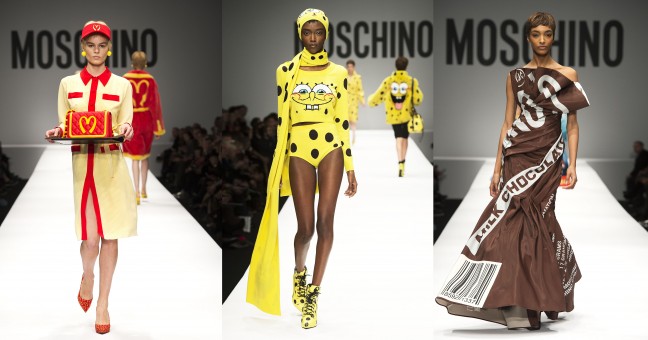Fashion designer Jeremy Scott’s takeover of the Italian luxury fashion house Moschino in October 2013 as creative director saw the brand morph into a company inspired and well aware of popular culture. The Fall/Winter 2014/15 show used pop culture and fast food as inspiration, with tribute to, “everyone’s favourite all-American guilty pleasure,” McDonald’s, Budweiser, truck-stop snacks and SpongeBob Square Pants (Hyland, V; 2014). The capsule collection was made available immediately online and sold out within 24 hours, prompting a form of fast fashion where aside from celebrity praise in the form of Miley Cyrus, Rihanna and Katy Perry, the popularity of the collection can be linked to the iconic subjects it uses.
Fashion has the ability to turn, “…the body into a discourse, a sign, a thing,” allowing ourselves to be exposed, “to grotesque openings toward the world,” (Hancock, Joseph H, Johnson-Woods, T & Karaminas, V, 2013; p.xii) where the influence can be bought and worn. The saleability of the Moschino collection is somewhat self-generated by the convergence between two areas of popular culture: fashion and subject matter. This merging on one level displays popular culture through fashion, but on another it articulates an understanding of popular culture that is extended to the consumer who buys the product.
Fiske notes, “the mundane is the crucial site of cultural significance, for the mundane is the only terrain upon which popular culture can be made to matter” (Fiske, J; 1995, pp.330). The collection’s use of popular codes that have become ordinary within society, such as the McDonald’s ‘M’, re-purposes their existence in culture prompting an appreciation for them and in turn a deeper connection to the consumer. Each piece also encodes, “social meanings about gender, sexuality and identity,” (Hancock, Joseph H, Johnson-Woods, T & Karaminas, V, 2013; p.xi), in the manner they were designed. The Hershey’s dress, flows like melted chocolate but also embodies the idea of treating yourself as you would on a ball or night out and the McDonald’s bag is an everyday accessory for the everyday kind of food that comes in a bag. These items encode cultural meaning so they can, “serve the interests of the people” (Fiske, J; 1995, pp.322).
References
Fiske, J. ‘Popular Culture,’ in Lentrichchia, F & McLaughlin, T 1995. Critical Terms for Literary Study, The University of Chicago Press, Chicago, pp.321-335.
Hancock, Joseph H, Johnson-Woods, T & Karaminas, V 2013. ‘Introduction’ in Fashion in Popular Culture: Literature, Media and Contemporary Studies, Intellect, UK, pp. xi-xvi.
Hyland, V 2014. ‘At Moschino, Jeremy Scott turns Pop Culture Trash into Sold-Out-In-Minutes Treasure,’ Elle Magazine: http://www.elle.com/fashion/a14689/jeremy-scott-for-moschino-profile/, March 2015.
